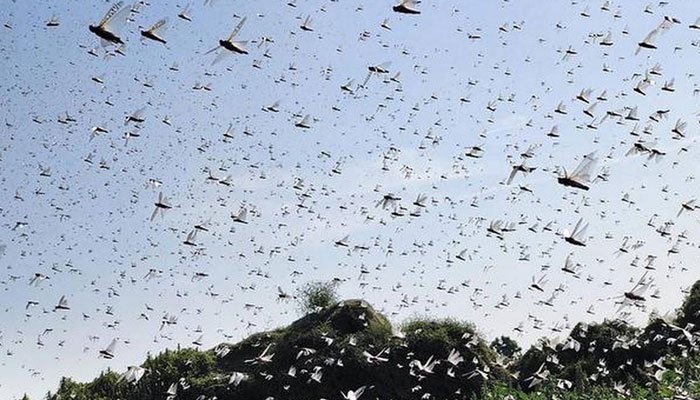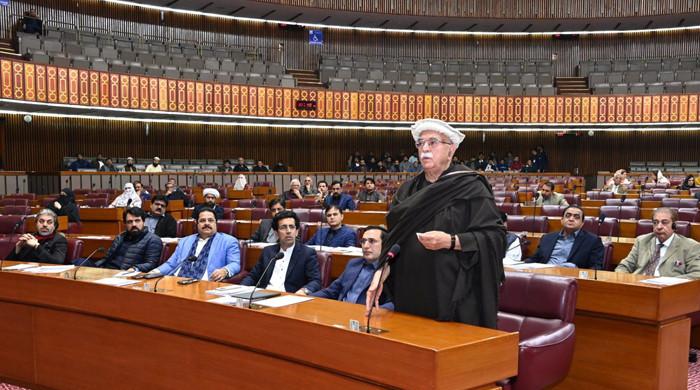Locusts deal severe damage to mango, cotton and other crops in Sindh, southern Punjab
NDMA chief says that a massive operation is underway in Multan, Bahawalpur, Dera Ghazi Khan, and Faisalabad divisions
May 26, 2020

MULTAN/RAJANPUR/KANDHKOT: Locusts attacked and severely damaged cotton, mango and other crops in various cities of Sindh and southern Punjab on Monday, giving rise to fears of more damage in the days to come if appropriate steps are not taken to protect crops from the insects.
The locust attack took place in different areas of Multan, Rajanpur, district Muzaffargarh and Kandhkot. Mango, cotton crops and rice saplings were severely damaged by the attack.
Read more: CM Sindh warns of 'massive' locust attack in letter to PM Imran
In Multan, locusts attacked trees located in parks and at sidewalks at the Qasim Bela, Cantt, Pull Bararan, Old Shujabad road, Chowk Shah Abbas and Vehari Road areas.
In Rajanpur, mango, cotton and other crops were damaged by the locust attack. In Muzaffargarh, locusts attacked crops and mango orchards in Doaaba, Lutkaran, Chak Rohari, Chak Mathan, Lalpur, Sanki and surrounding areas.
With no help from the government, locals in Muzaffargarh attempted to ward off the locusts by beating drums in an attempt to scare them away. To effectively eliminate locusts, farmers have called on the government to spray crops from airplanes instead of spraying only certain areas.
In Kandhkot, locusts destroyed rice saplings, grass and trees. Locals in the city demanded the government conduct aerial spray to ensure the protection of food crops.
Massive locust attack expected in Sindh in May: officials
Earlier, a report in The News had said that officials were concerned about farmlands in Sindh once again coming under a massive attack of locust swarms from Iran by May 15 which could prove even more harmful for the crops in the province as compared to the locust attack of the last year.
The information was shared by officials of the Plant Protection Department (PPD), who attended a high-level meeting at the Sindh Secretariat last month on the expected locust attack in the province.
The PPD officials had told Chief Secretary Syed Mumtaz Ali Shah that up to 60 countries around the world have been affected by locust swarms.
Members of the meeting were informed that 30 spots have been identified in Sindh where camps would be established for tackling the issue of the impending locust attack. Fifty-seven teams comprising 180 personnel were being created to address the emergency.
It was decided in the meeting that 100,000 litres of pesticide would be sprayed through aerial means while 25,000 litres of pesticide would be used against locust swarms via the boom spray method.
‘Massive operation underway’
Chairman National Disaster Management Authority (NDMA) Lieutenant General Muhammad Afzal in a media briefing on Tuesday shared details of the steps taken to fight the locust attack.
The NDMA chief said that a massive operation is underway in Multan, Bahawalpur, Dera Ghazi Khan, and Faisalabad divisions, along with Okara, Bhakar, and Layyah districts.
“We have enough stock of pesticides to check locust attack in Pakistan,” Afzal said.
“China has provided 100,000 litres of Malathion, and 75,000 litres Lambda, while 50,000 litres of latter will come from Japan.”
In addition to it, he said, the NDMA has ordered to procure 100,000 litres each of these pesticides to undertake spray against the locusts.
“The disaster management authority has also arranged nine planes for aerial spray in different parts of the country, including Sindh, Balochistan, Punjab, and Khyber Pakhtunkhwa,” Afzal said.
He said locusts can enter Pakistan from Iran and Muscat in the first and second weeks of the next month and the NDMA has deployed aeroplanes with sufficient spray equipment and pesticides in DG Khan, Dera Ismail Khan and along the Iran border to kill the insect then and there.
He said arrangements have also been made to undertake anti-locust spray in deserts of Thar and Cholistan.











